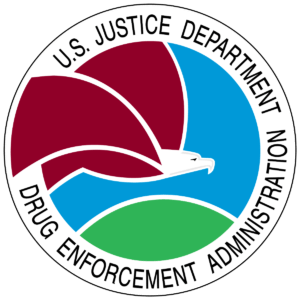The U.S. Drug Enforcement Administration (DEA) is a federal agency housed under the Department of Justice and tasked with quelling domestic drug trafficking. The DEA’s creation was a reaction to the counterculture movement of the 1960s. It was established in 1973 under President Richard Nixon, two years after he proclaimed drug abuse to be “public enemy number one” and thus initiated the “War on Drugs.” The agency is headquartered in Arlington, Virginia.
The DEA enforces the Controlled Substances Act (1970), whereby narcotics are categorized according to a determined level of risk. Factors used to assess risk level include a substance’s physiological effects, its potential for abuse, its public health impact, and whether there exists an accepted medical use. The Department of Health and Human Services has a central role in determining drug scheduling, but the DEA also has authority to initiate scheduling changes. While they are separate processes, FDA approval for medical or therapeutic use typically precedes a drug’s rescheduling.
Psychedelics
Most psychedelic drugs, as well as MDMA, are classified as Schedule I substances, the most restricted. Psychedelic-adjacent Ketamine is a Schedule III drug. Analogues are also subject to enforcement, even if they are not listed as a controlled substance. Psychedelic Science Review coverage of regulatory challenges posed by the conflict between psychedelics’ therapeutic potential and their scheduling. Psychedelic researchers at Johns Hopkins published a paper in 2018 arguing for the rescheduling of psilocybin, based on evidence of its medical applications.1
Cannabis
Controversially, cannabis remains a Schedule I substance, despite a growing decriminalization and legalization movement among states and its widespread medical use. The drug’s status severely restricts the ability to conduct the type of research needed to prove the plant’s medical value. Past studies showing the plant’s medical benefits were not large-scale, controlled, clinical trials and were therefore insufficient for a schedule change. A 2014 report by MAPS and the Drug Policy Alliance accused the DEA of blocking several attempts to reschedule cannabis over the years.
In a piece for Marijuana Moment, reporter Kyle Jaeger described one high-profile attempt: “In 1988, DEA Administrative Law Judge Francis Young famously challenged the agency’s classification of marijuana as a Schedule I drug, arguing that cannabis is ‘one of the safest therapeutically active substances known to man’ and ‘marijuana can be safely used within a supervised routine of medical care…It would be unreasonable, arbitrary, and capricious for DEA to continue to stand between those sufferers and the benefits of this substance in light of the evidence in this record.’”
Current Events
Informed by research demand and public comment, in late 2021, the DEA increased production quotas for a number of Schedule I substances including cannabis, psilocybin, psilocin, MDMA, and DMT. In a separate Marijuana Moment article, Jaeger wrote that the move “shows a willingness from the leading federal drug enforcement agency to recognize an emerging scientific field and promote studies into the substances regardless of their Schedule I status.”
In 2022, researchers and advocates pushed back via public comment on the DEA’s proposal to classify five tryptamines — 4-OH-DiPT, 5-MeO-AMT, 5-MeO-DET, 5-MeO-MiPT, and DiPT – as Schedule I substances. The challenges prompted Administrative Law Judge Teresa Wallbaum to initiate a formal hearing process in February. Based on the hearings, the judge may recommend against the proposed scheduling. DEA administrators, however, are not beholden to such recommendations.
